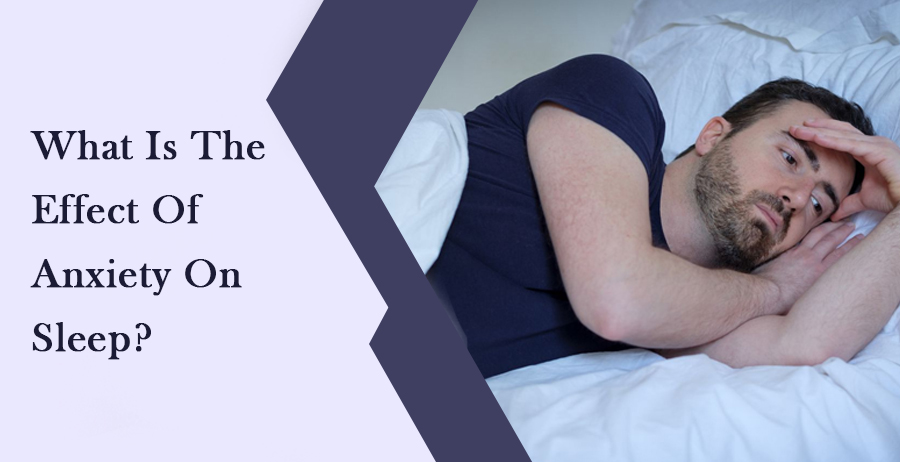Table of Contents
What Is The Effect Of Anxiety On Sleep?
Sleep, that ethereal realm where we seek refuge from the demands of the day, often becomes a battleground for those grappling with anxiety.
In this exploration, we delve into the intricate relationship between anxiety and sleep, dissecting the multifaceted ways in which anxiety disrupts our ability to embrace the refreshing embrace of a good night’s sleep.
🤔Understanding Anxiety
A natural and adaptive response to stress or perceived threats is anxiety.
It’s a common emotion experienced by people in various situations, from facing deadlines to navigating social interactions.
While anxiety is a normal part of life, chronic or excessive stress and anxiety can become problematic. Anxiety manifests both mentally and physically.
Mentally, it often involves persistent worry, fear, or racing thoughts. Physically, stress triggers a stress response, releasing hormones like adrenaline that prepare the body for action.
This response, known as the “fight or flight” mode, can lead to symptoms such as increased heart rate, tense muscles, and a heightened state of alertness.
Different forms of anxiety disorders exist, including Generalized Anxiety Disorder (GAD), social anxiety disorder, and panic disorder, each with its unique characteristics.
GAD, for example, involves excessive worry about various aspects of life, while social anxiety disorder revolves around fear of judgment or scrutiny in social situations.
Understanding anxiety involves recognizing its diverse manifestations and the impact it can have on both mental and physical well-being:
The Racing Mind
Picture this: it’s bedtime, and you’re nestled under your cozy blanket, ready to drift into dreamland. But, alas, your mind has other plans.
Anxiety can turn your brain power into a bustling marketplace of worries and thoughts, each competing for attention.
The result? A racing mind that refuses to settle, making it nearly impossible to embrace the tranquility needed for a good night’s sleep.
The constant mental chatter can range from concerns about the day’s events to more profound existential ponderings. To tackle this, consider implementing mindfulness techniques.
Techniques such as focusing on your breath or engaging in guided imagery can redirect your mind away from the whirlwind of anxious thoughts, paving the way for a more serene transition into sleep.
Take Zopisign 10 for a good night’s sleep and wake up refreshed.
The Physical Toll
Anxiety is not just a mental game; it’s a physical one, too. The body responds to stress with a surge of hormones, including adrenaline.
This physiological response primes the body for action, triggering the infamous “fight or flight” mode.
While this is a helpful survival mechanism in threatening situations, it’s less than ideal when you are trying to wind down for the night.
The physical symptoms of anxiety, such as a racing heart, tense muscles, and a heightened state of alertness, can persist when you’re trying to sleep.
To combat this, gradual relaxation of the muscles (a method in which you gradually tighten and then release distinct muscle groups) might assist in relieving physical stress by alerting your body that it’s time to relax.
The Vicious Cycle
Anxiety and sleep often engage in a cruel dance, forming a vicious cycle that can be hard to break. The less sleep you get, the more susceptible you become to anxiety.
Conversely, heightened stress can lead to even more disrupted sleep. It’s a catch-22 that many find themselves caught in, desperately seeking an escape route to restful slumber.
Breaking this cycle requires a multi-faceted approach. Maintaining a regular sleep schedule and creating a conducive sleep environment are two sleep hygiene practices that can improve sleep quality.
This can weaken anxiety’s grip on your health.
Sleep Disorders Amplified
For some, anxiety doesn’t just disrupt sleep—it invites sleep disorders to the party.
Conditions like insomnia, characterized by difficulty falling or staying asleep, often find fertile ground in the anxious mind.
The constant worry and restlessness make it challenging to establish the bedtime routine necessary for a healthy sleep pattern.
In addressing this, consider Cognitive Behavioral Therapy For Insomnia (CBT-I), a structured program that helps identify and replace thoughts and behaviors that cause or worsen sleep issues.
CBT-I has demonstrated effectiveness in treating insomnia and is particularly beneficial for those with comorbid anxiety.
With Zopisign 7.5mg, you’ll awaken revitalized and ready to face the day, promoting a peaceful night’s sleep while managing sleep-related issues.
The Impact on Sleep Architecture
Anxiety doesn’t just play havoc with falling asleep; it can also interfere with the architecture of your sleep.
Rapid Eye Movement (REM) sleep, the stage where vivid dreams occur, and memory consolidation takes place, can be particularly affected.
Stress has a knack for stealing away the deep, restorative phases of sleep, leaving you feeling sleepy and unrested.
To address this, focus on cultivating a consistent sleep schedule.
Aim for the recommended 7-9 hours of sleep per night, ensuring that your sleep includes sufficient time in the deeper stages, allowing your body and mind to reap the full benefits of restorative rest.
💡Tips for Taming Anxiety and Improving Sleep
- Create a Calming Bedtime habit: Develop a calming pre-sleep habit to indicate to your body and mind that it’s time to unwind. Activities such as reading a book, having a warm bath, or performing mild yoga might fall into this category.
- Limit Screen Time Before Bed: The blue light generated by screens can disrupt the generation of melatonin, the hormone responsible for sleep regulation. Before going to sleep, avoid using screens for at least an hour.
- Awareness and relaxation techniques should be practiced: Make mindfulness or relaxation activities a part of your everyday practice. Deep breathing, meditation, and progressive muscle relaxation are all techniques that can help quiet the mind and lessen worry.
- Build the Bedroom a Sleep Sanctuary: Make your bedroom a sleep sanctuary. Invest in a comfortable mattress and pillows, regulate the temperature of the room, and minimize any distracting noises or lights.
- Limit stimulant drugs and Coffee: Coffee use should be limited, especially in the afternoon and evening. Stimulants might increase anxiety and make it difficult to fall asleep.
✍Final Words
In the intricate dance between anxiety and sleep, finding a harmonious balance is key.
By understanding how stress impacts our sleep and implementing targeted strategies, we can reclaim the night and enjoy the rejuvenating rest we all crave.
Remember, the journey to restful sleep is a personal one, and with patience and persistence, you can cultivate habits that lead to a more peaceful and refreshing slumber. Sweet dreams await!





